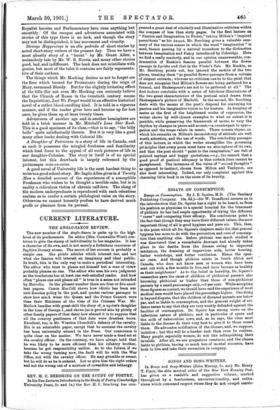pressed a great deal of scholarly and illuminative criticism within
the compass of less than sixty pages. In the first lecture on " Passion and Imagination in Poetry," taking Milton's "inspired parenthesis" as his aooeieh, Mr. Beeching gives a valuable sum- mary of the various senses in which the word " imagination " is used, thence passing by a natural transition to the distinction between Imagination and Fancy introduced by Coleridge. Here we find a really masterly, and in our opinion unanswerable, con- demnation of Ruskin's famous parallel between the flower passage in Lyeidas and that in the 1Vinter's Tale. Mr. Ruskin, as Mr. Beeching points out, has ignored the motive of the two pieces, treating them "as parallel flower-passages from a volume of elegant extracts ; whereas no criticism can be to the pbint that does not recognise that Milton's flowers are being gathered for a funeral, and Shakespeare's are not to be gathered at all." The first lecture concludes with a series of felicitous illustrations of the two great characteristics of the poetical mind drawn from Shakespeare's picture of Macbeth. In the second, Mr. Beeching deals with the means at the poet's disposal for conveying his passion and his imaginative vision to his hearers. In treating of metre as the first of the heightened modes of expression, the writer shows by well-chosen examples to what an extent it is possible, while preserving the framework of metre, to vary the rhythm by changes in pause and accent. —a counterpart to synco- pation and the tempo rebate in music. There remain rhyme, on which his remarks on Milton's inconsistency of attitude are well worth attention, and the use of words. The concluding passages of this lecture, in which the writer exemplifies the governing principles that every poem must have an atmosphere of its own, and that the poet should "paint to the imagination," are fall of pointed Sayings and happy quotations,—e.g., the remark that a good proof of poetical adequacy is that certain lines cannot be paraphrased. The instances of the value of "second thoughts" as opposed to instinct, chosen from Milton and Tennyson, are also most interesting. Indeed, our only complaint against this charming little book is on the score of its brevity.






































 Previous page
Previous page